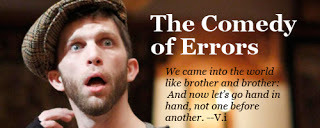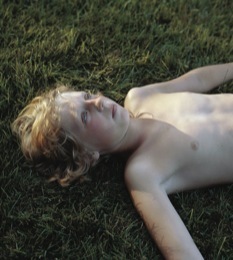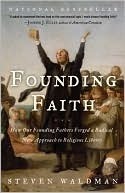Clifford Garstang's Blog, page 139
January 19, 2011
New Issue of Prime Number Magazine
 I'm excited to release today the new issue (No. 5) of Prime Number Magazine. This issue is packed! We've got 6 short stories, 3 essays, 6 groups of poems, a review and an interview. Not to mention a beautiful cover drawing done just for us! Be sure to check it out. And remember, we're now reading for Issue 7, so send us some terrific work![image error]
I'm excited to release today the new issue (No. 5) of Prime Number Magazine. This issue is packed! We've got 6 short stories, 3 essays, 6 groups of poems, a review and an interview. Not to mention a beautiful cover drawing done just for us! Be sure to check it out. And remember, we're now reading for Issue 7, so send us some terrific work![image error]
Published on January 19, 2011 05:30
January 18, 2011
The New Yorker: "The King of Norway" by Amos Oz

On a kibbutz in Israel, Zvi Provizor is known as the Angel of Death because he is always delivering news of some disaster or other that he hears reported on the radio. Ironically, though, he's the kibbutz's gardener and is lauded for his work in caring for the flowers and other plants. He's also a bachelor who shows no interest in women and in fact doesn't care to be touched by anyone. But he meets a young teacher, Luna Blank (Empty Moon?), and she grows interested in him. They spend a great deal of time together until she touches him, and that drives him away.
His rejection affects her, and eventually she leaves the kibbutz amidst rumors and allegations, and the gardener goes back to being the bearer of disastrous news (including the death of the King of Norway, which is where the title comes from).
Not only does all the bad news he hears suggest that he can't bear the thought of bringing a child into the world, perhaps explaining his intimacy issues, it seems that the time of the story is not long removed from World War II, and Ben-Gurion is still Prime Minister. (He says, "I read in the newspaper that in Hiroshima, ten years after the bomb, there are still no birds.") Perhaps his experience in his native Poland shaped his fascination with the horrors he reports to his fellow kibbutz residents.
It's a readable story (sorry if you don't have a subscription because it's not online), but it seems to just stop rather than end.
January 17, 2011: "The King of Norway" by Amos Oz[image error]
Published on January 18, 2011 07:11
January 15, 2011
American Shakespeare Center: The Comedy of Errors

I saw The Comedy of Errors at the American Shakespeare Center's Blackfriars Playhouse last night and was reminded of what I love about that place: high-energy performances, great actors, terrific music, appreciative audiences. You've got to see it.
I was in the first row—not where I usually sit—so I didn't get a great look at the rest of the audience, but I got a very good look at the actors. (The audience was pretty interesting, from what I could see, though: a lot of people in Elizabethan costumes, plus a number of visitors who looked like they might have been from India and Africa.)
"Comedy" isn't a brilliant play, but it is hilarious, with lots of jokes and slapstick opportunities, which the actors exploit fully. In fact, it's a pretty silly story: twin boys, boys, both named Antipholus, served by twin boys, both named Dromio, are separated from their parents. Now, many years later, they all wind up in Ephesus—dressed exactly alike, somehow—and the opportunities for mistaken identity are nearly endless.
This production is part of the Actors' Renaissance Season, in which the resident company, without directors, puts on five shows in repertory, mounting each in a very short rehearsal period. It's amazing, and I think that's one thing that contributes to the high energy. The whole experience is breathtaking. Last night, everyone was excellent. The Antipholuses—straight men, for the most part—were played by Patrick Midgley and John Harrell and the comic Dromios by Gregory Jon Phelps and Tyler Moss. (Harrell is an ASC fixture and Midgley just completed the Summer/Fall season; it's great to have Phelps and Moss back in town, as both are audience favorites.) Adriana, the wife of Antipholus of Ephesus, is played perfectly by Sarah Fallon and her perky sister, Luciana, is Miriam Donald.
Favorite moments: · * Phelps as Dromio of Syracuse describing Nell:
· * Harrell as Antipholus of Ephesus telling the Duke all the crazy things that have happened· * The appearance of Chris Johnston as the Courtesan, but made up as a Geisha· * Allison Glenzer's onstage costume change near the end of the play (but I won't say more about that so I don't spoil it for anyone)
ASC did Comedy not long ago, when the touring company took it on the road and then brought it back to Blackfriars. Here's what I had to say about that production: 2009 Comedy of Errors
You won't want to miss this one.[image error]
Published on January 15, 2011 07:46
January 13, 2011
The New Yorker: "The Years of My Birth" by Louise Erdrich
 The ending here feels rushed to me. In fact, there is an interesting but slightly tedious long first act, where Linda is born, abandoned, and grows up. (The fact that she has birth defects needing attention along the way.) Then there's a second act that's about the same length in which Linda at age 50 hears from her mother. This brings back some painful details, and Linda is a woman who does not like pain. Nonetheless, she has to recall that she had a fraternal twin, that her defects are the result of being crushed in the womb by her twin, and that her parents gave her up. She meets with the mother and it goes okay until the mother reveals that the twin, Linden, needs a kidney transplant and Linda is their only hope. Linda is appropriately disgusted—this is clearly all the mother had wanted. Act III: Linda actually plans to go through with it because the guy is her twin, right? So she goes for blood tests and meets this guy Linden and he's a bigger piece of shit than the mother. And then it's over, and that's why I say the ending feels rushed.
The ending here feels rushed to me. In fact, there is an interesting but slightly tedious long first act, where Linda is born, abandoned, and grows up. (The fact that she has birth defects needing attention along the way.) Then there's a second act that's about the same length in which Linda at age 50 hears from her mother. This brings back some painful details, and Linda is a woman who does not like pain. Nonetheless, she has to recall that she had a fraternal twin, that her defects are the result of being crushed in the womb by her twin, and that her parents gave her up. She meets with the mother and it goes okay until the mother reveals that the twin, Linden, needs a kidney transplant and Linda is their only hope. Linda is appropriately disgusted—this is clearly all the mother had wanted. Act III: Linda actually plans to go through with it because the guy is her twin, right? So she goes for blood tests and meets this guy Linden and he's a bigger piece of shit than the mother. And then it's over, and that's why I say the ending feels rushed.Apart from that minor complaint about the ending, though, I thought this was a terrific story, with excellent complications. Linda is misshapen, but she doesn't worry about it. She has a job. A dog. She believes the reason she never married is because she doesn't like pain. Also, though, she's white, and was adopted into a family on an Indian reservation. Her brothers and sisters, not adoptees, all left. She didn't. And the description of the mother when they first meet in the diner is outstanding.
It's a little early to be talking about Story of the Year, but this could be a contender.
This Week in Fiction: Louise Erdrich
January 10, 2011: "The Years of My Birth" by Louise Erdrich[image error]
Published on January 13, 2011 16:36
January 8, 2011
Guest Post: David Philip Mullins
 As a member of a global community preoccupied with screens and buttons--with brisk communication and facile modes of entertainment--I was happy to see the special section on criticism in last week's New York Times Book Review, titled "Why Criticism Matters." (It might have been titled "Why Books Matter.") Six critics--Stephen Burn, Katie Roiphe, Pankaj Mishra, Adam Kirsch, Sam Anderson, and Elif Batuman--explore the topic at length. Worth checking out!
As a member of a global community preoccupied with screens and buttons--with brisk communication and facile modes of entertainment--I was happy to see the special section on criticism in last week's New York Times Book Review, titled "Why Criticism Matters." (It might have been titled "Why Books Matter.") Six critics--Stephen Burn, Katie Roiphe, Pankaj Mishra, Adam Kirsch, Sam Anderson, and Elif Batuman--explore the topic at length. Worth checking out! David Philip Mullins
is the author of
Greetings from Below
David Philip Mullins
is the author of
Greetings from Below
 (Sarabande), a collection of linked short stories. He is a graduate of the Iowa Writers' Workshop and his work has appeared in The Yale Review, The Massachusetts Review, Fiction, and elsewhere. He has won the Mary McCarthy Prize in Short Fiction and has received awards from Yaddo and the Sewanee Writers' Conference. He lives in Omaha, Nebraska, where he is an assistant professor of creative writing at Creighton University.[image error]
(Sarabande), a collection of linked short stories. He is a graduate of the Iowa Writers' Workshop and his work has appeared in The Yale Review, The Massachusetts Review, Fiction, and elsewhere. He has won the Mary McCarthy Prize in Short Fiction and has received awards from Yaddo and the Sewanee Writers' Conference. He lives in Omaha, Nebraska, where he is an assistant professor of creative writing at Creighton University.[image error]
Published on January 08, 2011 10:30
January 6, 2011
The New Yorker: "Getting Closer" by Steven Millhauser
 I like Millhauser's work, and this is well done as far as it goes, but it doesn't make for much of a story. Not to mention that it seems geared toward much younger readers than the usual New Yorker Story.
I like Millhauser's work, and this is well done as far as it goes, but it doesn't make for much of a story. Not to mention that it seems geared toward much younger readers than the usual New Yorker Story.The point of view character, Jimmy, is nine. His older sister is thirteen. The family has gone on a day-long adventure to a sandy beach on a river, which for Jimmy is heaven: floating on an inner tube, eating a hot dog, lying in the sun. It marks both the real beginning of summer and its highpoint. But the real pleasure in the day is in the anticipation, and Millhauser drags this out for as long as possible. Everything is about Jimmy getting closer and closer to the beginning of this glorious day, which is the moment when he gets in the river. Now, as it happens, he's also somewhat afraid. He can't swim, and so the fact that his older sister is swimming in the river is something of an embarrassment. But he's just a kid, and he's growing up, and so he "begins his day" by entering the river.
Okay. It's interesting to think about what's going on in Jimmy's head. Or maybe to speculate about the symbolism represented by the river. But beyond that, I don't think this one is terribly memorable.
January 3, 2011: "Getting Closer" by Steven Millhauser
Published on January 06, 2011 18:25
SWAG WriterDay for January
 SWAG Writers (that's Staunton, Waynesboro, Augusta Group of Writers) is once again holding a happy hour for area writers. We get together on the second Wednesday each month at Mockingbird in Staunton from 6-8pm. Join us next Wednesday, January 12 to mingle with other local writers, share tips, etc., and help plan future SWAG events.
SWAG Writers (that's Staunton, Waynesboro, Augusta Group of Writers) is once again holding a happy hour for area writers. We get together on the second Wednesday each month at Mockingbird in Staunton from 6-8pm. Join us next Wednesday, January 12 to mingle with other local writers, share tips, etc., and help plan future SWAG events.
Published on January 06, 2011 05:11
January 1, 2011
Happy New Year and Happy Blogiversary
 That's Happy New Year in Chinese (which I get to say again on February 4 when we celebrate the Chinese New Year). 2010 wasn't a bad year in writing for me, although it wasn't a great year in publishing. One story appeared in print, another online. Mostly I've been engrossed in revisions to my novel--which are just about done. I had hoped that my novel in stories would have sold to a publisher by now, but it hasn't. Maybe 2011 will bring better news on that front. 2010 did see the debut of the magazine I edit, though: Prime Number Magazine. That's been both fun and gratifying, and I think we've published some fine work.
That's Happy New Year in Chinese (which I get to say again on February 4 when we celebrate the Chinese New Year). 2010 wasn't a bad year in writing for me, although it wasn't a great year in publishing. One story appeared in print, another online. Mostly I've been engrossed in revisions to my novel--which are just about done. I had hoped that my novel in stories would have sold to a publisher by now, but it hasn't. Maybe 2011 will bring better news on that front. 2010 did see the debut of the magazine I edit, though: Prime Number Magazine. That's been both fun and gratifying, and I think we've published some fine work.Besides being the New Year, January 1 marks the anniversary of the beginning of this blog. That's right, Perpetual Folly is now six years old. I continue to get a steady stream of readers, so I think it's worth it. I don't have any major plans for changes to the blog, although I'd like to invite more authors to do guest spots here to promote their books. If you've got a book coming out in 2011, please get in touch with me.
This being the New Year, I've made the usual resolutions. I don't think I'll share them all, but the main resolution is simple and one that I recommend: Live in the moment.
And the moment, if I've timed this right, is 1.11.11 11:11AM
Published on January 01, 2011 08:11
2010 New Yorker Story of the Year: "Foster" by Claire Keegan
 Congratulations to Claire Keegan, whose brilliant short story "Foster" has been chosen as the 2010 New Yorker Story of the Year! Thank you to everyone who voted this year.
Congratulations to Claire Keegan, whose brilliant short story "Foster" has been chosen as the 2010 New Yorker Story of the Year! Thank you to everyone who voted this year.Here is the discussion we had about this story when it appeared in February: "Foster" by Claire Keegan.
Runner-up was "Costello" by Jim Gavin. Third place goes to "Boys Town" by Jim Shepard. Both of those were also wonderful stories.
Published on January 01, 2011 07:32
December 30, 2010
Reading Liberally
 Earlier this year I founded a local chapter of Reading Liberally, a national "book club" that is part of a larger organization called Living Liberally. (We have a social chapter in our area, too: Drinking Liberally.) The book club meets once a month (in a bar, just to make it even more fun) to discuss books of interest to liberals--not just books we agree with, but books that will help us understand important issues.
Earlier this year I founded a local chapter of Reading Liberally, a national "book club" that is part of a larger organization called Living Liberally. (We have a social chapter in our area, too: Drinking Liberally.) The book club meets once a month (in a bar, just to make it even more fun) to discuss books of interest to liberals--not just books we agree with, but books that will help us understand important issues.For January we're reading Founding Faith
 by Steven Waldman, co-founder of Beliefnet, about the real faith of our founding fathers and the real meaning of the separation of church and state. The basic premise--I'm not very far into it yet--seems to be that the Left and Right both misrepresent the religion of the founders and as a result don't fully understand what the wall of separation is all about. I think we'll have an excellent discussion. (January 27 at 6:30 pm at Irish Alley on Johnson Street in Staunton, VA.)
by Steven Waldman, co-founder of Beliefnet, about the real faith of our founding fathers and the real meaning of the separation of church and state. The basic premise--I'm not very far into it yet--seems to be that the Left and Right both misrepresent the religion of the founders and as a result don't fully understand what the wall of separation is all about. I think we'll have an excellent discussion. (January 27 at 6:30 pm at Irish Alley on Johnson Street in Staunton, VA.)Over the year we've read a number of other books that brought us fine discussions: Agenda for a New Economy
 (David Korten), In Defense of Food
(David Korten), In Defense of Food  (Michael Pollan), Half the Sky
(Michael Pollan), Half the Sky (Nicholas Kristoff and Sheryl WuDunn), Color Blind
(Nicholas Kristoff and Sheryl WuDunn), Color Blind (Tim Wise), Mountains Beyond Mountains
(Tim Wise), Mountains Beyond Mountains  (Tracy Kidder), The Conscience of a Liberal
(Tracy Kidder), The Conscience of a Liberal (Paul Krugman), and Beyond Fundamentalism
(Paul Krugman), and Beyond Fundamentalism  (Reza Aslan). It's been a great year in reading.
(Reza Aslan). It's been a great year in reading.If you're interested in joining us, visit our Facebook Page or our website to sign up for notices.
Published on December 30, 2010 15:36



